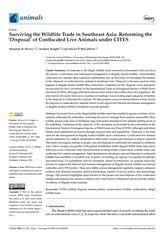Shannon Noelle Rivera
Research Themes
Gender & Wildlife Crime
|
More Soon..UNODC, Research and Analysis Branch, Wildlife Crime Research Unit
Currently serving as an illegal wildlife trade specialist working to improve knowledge of illegal wildlife trade trends with a specific focus on the gender dynamics of the trade for several key species for South America. This work falls under a new partnership between UNODC and USAID on exploring the role that women can play in both facilitating and preventing wildlife crime. Learn more about UNODC's Wildlife Crime Research Unit. 2023 | To be shared following publication |

